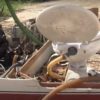 Wounded Nature Working Veterans has embraced a new way of making a real environmental difference. We have begun working with state and local agencies, as well as many private companies to facilitate the removal of derelict and abandoned boats from our coastal waterways and tidal marshes.
Wounded Nature Working Veterans has embraced a new way of making a real environmental difference. We have begun working with state and local agencies, as well as many private companies to facilitate the removal of derelict and abandoned boats from our coastal waterways and tidal marshes.
When we decided to become an organization devoted to cleaning up our critical coastal areas and wildlife habitats, we realized that the biggest, hardest-to-remove debris cluttering our coastlines was all related to abandoned, derelict, or sunken boats.
We’ve done our research and have partnered with some amazing organizations listed in our Boat Salvage Directory, to start removing boats from our waterways and tidal marshes. We have become increasingly aware that the casual disposal of boats made out of fiberglass is harming our coastal marine life. Some nations around the world are even worried about their already overstretched landfills.
Some of the problems we’ve encountered recycling boat fiberglass are:
- There is no consistency in the products used by different manufacturers. Each manufacturer has their own preferred compound mix and this limits the ways that the materials can be recycled.
- Boats being cut up for recycling are processed in non-controlled areas and, as a result, recyclers can contaminate the disassembly area and the air where the preparations are being conducted.
- All metal and wood need to be removed and separated from the fiberglass. Due to the age of the vessels being scrapped, many of the metal parts are corroded and cannot be easily removed.
- Fiberglass-encapsulated wood cannot be separated, and therefore, cannot be recycled.
Boats that were built in the fiberglass boom of the 1960s and 1970s are now dying. The microparticles and resins holding the fiberglass together contain phthalates, a massive group of chemicals associated with severe human health impacts from ADHD to breast cancer, obesity, and male fertility issues.
Fiberglass boats are made from epoxy. Epoxy is made with acrylic alcohol and is dissolved in styrene to create a vinyl ester resin and organic peroxides are used as a catalyst. Because these and other resins are used only in industry, the average person will encounter polyester resins as the most common fiberglass resins.
Fiberglass boats last for decades, and the polyester resins holding the glass fibers last much longer. It persists where it exists, on the water protecting lives, or in the landfill after being junked and crushed.
Fiberglass uses what’s known in the industry as a thermoset polymer, and these types of polymers can’t be melted and remolded into a new structure. (The best use, though not often economically feasible, is to grind it up where it can be recycled into reinforcement for concrete or asphalt.)
The many benefits of modern polymers, including health and safety, economy, aesthetics, strength, and efficiency of processing are serious concerns and factor heavily against the ecological downsides.
Research finds that America as a whole has a pretty good track record for safe disposal and recycling, but our government does not do such a great job of affecting the disposal processes in other countries.
One of the reasons this is such a big factor is that the west coast ecology of the US and Alaska are affected by the Pacific Ocean, which, in turn, is affected by large commercial fleets that aren’t all American.
Studies indicate that millions of fiberglass boats are still in use. And, with the current lifespan of these fiberglass boats, even if a law was enacted today, this would still be a problem for our grandchildren.
What is the government doing about the incredible amount of fiberglass boats cluttering up critical coastal areas? Is spending public resources to clean up abandoned, derelict boats a solution?
We found information that some states already have plans and programs regarding boat recycling or disposal. This group was chosen for the following reasons: Florida is the largest boat market in the USA, Oregon is on the Columbia River and the Pacific Coastline, Washington and California because of their coastlines and population, Alaska is experiencing dramatic environmental changes, and finally a last minute find, our CEO, Rudy Socha, also found a pilot program for recycling boats in Rhode Island.
FLORIDA
Ravenarkboats.com states, “The Florida Fish and Wildlife Conservation Commission (FWC) offers grants that local governments (not private citizens or nongovernmental organizations) can use to get rid of derelict and abandoned vessels after the owner has been provided due process. Florida Department of Environmental Protection or the U.S. Army Corps of Engineers, depending on jurisdiction. Sadly only $1,000,000 was made available, and the boats still end up in landfills.”
Wounded Nature-Working Veterans has been speaking with Florida state officials to start working on the problem with them.
CALIFORNIA
California’s Division of Boating and Waterways sponsors a no-cost Vessel Turn-In Program (VTIP).
WASHINGTON
The Washington Department of Natural Resources has a Vessel Turn-In Program. It’s also worth mentioning the Composite Recycling Technology Center in Port Angeles, Washington, was funded by a US Department of Commerce grant and is a 25,000-square-foot composite recycling technology center, that makes new products out of composite recycling.
OREGON
All we could find here was the Oregon State Marine Board’s guidelines located on their state website.
ALASKA
The Alaska Department of Fish and Game has at its disposal the Abandoned and Derelict Vessels Act AS 30.30. Critics and researchers agree that this has been largely ineffective. With over 33,000 miles of shoreline, the state of Alaska prides itself on being one of the last bastions in the country to care about ‘individual rights’
Due in part to the state’s stance on ‘individual rights’, abandoned boats are now a common sight on many estuaries and beaches, leaking heavy metals, micro-glass, and phthalates. Without action by the state, they currently and for the foreseeable future will pose a hazard to human health and threats to local ecology.
RHODE ISLAND
The Rhode Island Fiberglass Vessel Recycling (RIFVR) Pilot Project will explore solutions for the sustainable disposal of fiberglass boats, by dismantling and re-processing fiberglass hulls into cement as an alternative to landfills.
In summary, we find boats have been scattered throughout many different locations. The age and length of time these boats have been derelict, abandoned or sunken, vary greatly. Some are newer victims of accidents and some are hundreds of years old, making recycling difficult at best. Also, recycling preparations need to be carried out before shipping to a recycling center.
Breaking up fiberglass in remote locations creates fiberglass, phthalate, and microplastic-contaminated hot spots that have serious impacts on wildlife and humans. Separating and preparing fiberglass for shipping to a recycling center does not make economic sense, it is extremely labor intensive and creates environmental contamination wherever the work is taking place.
We have dedicated ourselves to helping solve these issues. We are working with all of our partners, state agencies, and others to combat this issue and clean and restore our critical coastal areas to their original, pristine condition.
Please click these links to find out more about what you can to do Support our mission or Volunteer on one of our Cleanups.
